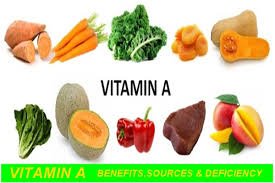
Vitamin A can be found in several different forms, and food like carrots contain a wealth of vitamin A. Vitamin A is found in different forms. Vitamin A occurs in meat, fish, and dairy produce. Pro-vitamin A is stored in fruits, vegetables, and other plant-based products. Retinol is the predominant, active form of vitamin A found in the blood. Retinyl palmitate is the storage form of the vitamin. Beta-carotene is a precursor of vitamin A and is found in plants. This "pro-vitamin," in itself an antioxidant, is converted into vitamin A as needed by the body, so there is no risk of overdose or toxicity.
The importance of Vitamin A
Vitamin A is an essential vitamin needed for growth and development, cell recognition, vision, immune function, and reproduction.
It is a powerful antioxidant and acts as a hormone in the body, affecting the expression of genes and thereby influencing phenotype. It also helps the heart, lungs, kidneys, and other organs to function correctly.
Deficiency
As vitamin A affects a wide range of body functions, a deficiency can lead to a variety of problems. These include:
- night blindness
- a higher risk of infections
- fertility issues
- delayed growth in children
Benefits
Lowering cancer risk
Adequate intakes of carotenoids from fruits and vegetables are associated with a lower risk of lung cancer, but the use of beta-carotene and vitamin supplements have not shown the same results. One meta-analysis suggests that some forms of vitamin A may help protect against prostate cancer. Studies in Japan have suggested that beta-carotene may help prevent colon cancer.
Treating type 2 diabetes
Retinoic acid, a derivative of vitamin A, has been found to normalize blood sugar in mice with diabetes.
Healthful skin and hair Vitamin A is important in the growth of all bodily tissues, including skin and hair. It contributes to the production of sebum, the oil that helps maintain levels of moisture in the skin and hair.
Sources
Leafy greens are a rich source of Vitamin A Ready-made retinol, the active form of vitamin A, only comes from animal sources. The richest sources of retinol are: organ meats, such as liver fatty fish, salmon, and fish oils butter, milk, and cheese eggs. Plant-based foods contain carotenoids, antioxidant forms of vitamin A. These are converted to retinol in the body. Carotenoid is an orange pigment that contributes to the color of certain fruits and vegetables.
Vegetable sources that are rich in carotenoids are:
- pumpkin , carrots, squash and other orange-colored vegetables
- sweet potatoes
- orange-colored fruits, such as cantaloupes, papayas, and mangos.
Plant foods rich in beta-carotene include:
- broccoli, spinach, turnip greens, and other dark, leafy green vegetables
- zucchini
- peppers
Thank you for reading and if you find my content valuable please upvote
and feel free to Follow Me
Hi! I am a robot. I just upvoted you! I found similar content that readers might be interested in:
https://www.medicalnewstoday.com/articles/219486.php